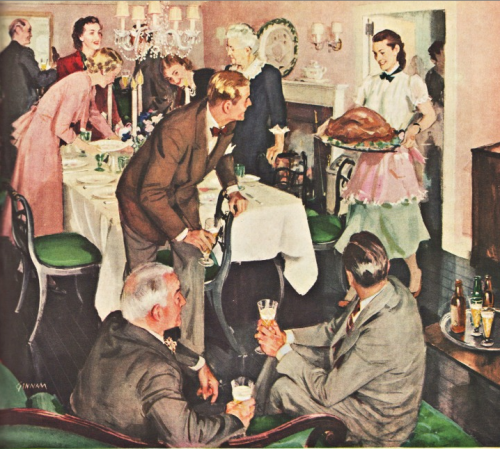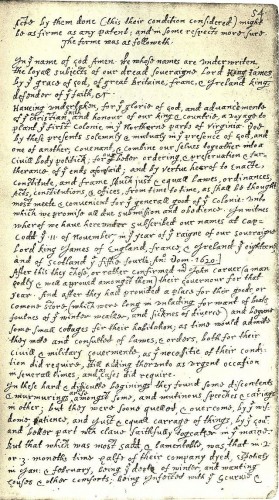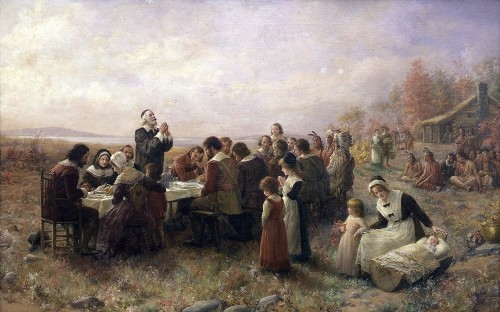(No, really. That is exactly what we look like.)
Holidays
Happy Thanksgiving
The Mayflower Compact
In the name of God, Amen. We, whose names are underwritten, the loyal subjects of our dread Sovereign Lord King James, by the Grace of God, of Great Britain, France, and Ireland, King, defender of the Faith, etc.
Having undertaken, for the Glory of God, and advancements of the Christian faith and honor of our King and Country, a voyage to plant the first colony in the Northern parts of Virginia, do by these presents, solemnly and mutually, in the presence of God, and one another, covenant and combine ourselves together into a civil body politic; for our better ordering, and preservation and furtherance of the ends aforesaid; and by virtue hereof to enact, constitute, and frame, such just and equal laws, ordinances, acts, constitutions, and offices, from time to time, as shall be thought most meet and convenient for the general good of the colony; unto which we promise all due submission and obedience.
In witness whereof we have hereunto subscribed our names at Cape Cod the 11th of November, in the year of the reign of our Sovereign Lord King James, of England, France, and Ireland, the eighteenth, and of Scotland the fifty-fourth, 1620.
Thanks to all the people who came to America at the hazard of life and limb and who built this country and gave it to us to build up and make better and pass on in our turn.
God bless the Pilgrims who settled in New England and brought (almost) the first seeds of Constitutional self-government to this continent. They arrived in what is now Massachusetts on November 21, 1620 (under the current calendar). It is cold in Massachusetts in November. They had thousands of miles of stormy sea behind them, and a cold, bare, unfriendly wilderness before them, not a single roof or fireplace for shelter or warmth. It was touch and go. They lost many of their number during the first winter. They had many practical details to attend to when they arrived. But the first thing they did before they set foot on the new continent was to covenant and combine themselves in to a “civil body politic” to live under law and by orderly political processes. We can learn from their example.
God bless America. God bless our Chicago Boyz contributors and readers. God bless our service members, past and present, especially those in harms way to defend our nation. God bless the people travelling and staying with families.
Thank you to Jonathan for starting this blog in 2002 and keeping it going.
May there be peace and happiness in all homes and across the land — and if we fall short of this high standard, here and there, let us work to do better in the days ahead.
I hope no one is too busy poking around the Internet and not paying attention to the turkey. Make sure you don’t over-cook it. May the gravy come out perfectly, and may there be enough pie for everybody to get two pieces of the kind they like best.
Thanksgiving and Temporal Bigotry
(rerun, with updates)
Stuart Buck encountered a teacher who said “Kids learn so much these days. Did you know that today a schoolchild learns more between the freshman and senior years of high school than our grandparents learned in their entire lives?” (“She said this as if she had read it in some authoritative source”, Stuart comments.)
She probably had read it in some supposedly-authoritative source, but it’s an idiotic statement nevertheless. What, precisely, is this wonderful knowledge that high-school seniors have today and which the 40-year-olds of 1840 or 1900 were lacking?
The example of knowledge that people usually throw out is “computers.” But the truth is, to be a casual user of computers (I’m not talking about programming and systems design), you don’t need much knowledge. You need “keyboarding skills”once called “typing.” And you need to know some simple conventions as to how the operating system expects you to interact with it. That’s about it. Not much informational or conceptual depth there.
Consider the knowledge possessed by by the Captain of a sailing merchant ship, circa 1840. He had to understand celestial navigation: this meant he had to understand trigonometry and logarithms. He had to possess the knowledgemostly “tacit knowledge,” rather than book-learningof how to handle his ship in various winds and weathers. He might well be responsible for making deals concerning cargo in various ports, and hence had to have a reasonable understanding of business and of trade conditions. He had to have some knowledge of maritime law.
Outside of the strictly professional sphere, his knowedge probably depended on his family background. If he came from a family that was reasonably well-off, he probably knew several of Shakespeare’s plays. He probably had a smattering of Latin and even Greek. Of how many high-school (or college) seniors can these statements be made today?
(In his post, Stuart compares knowledge levels using his grandfathera farmeras an example.)
Today’s “progressives,” particularly those in the educational field, seem to have a deep desire to put down previous generations, and to assume we have nothing to learn from them. It’s a form of temporal bigotry. Indeed, Thanksgiving is a good time to resist temporal bigotry by reflecting on the contributions of earlier generations and on what we can learn from their experiences.
As C S Lewis said: If you want to destroy an infantry unit, you cut it off from its neighboring units. If you want to destroy a generation, you cut it off from previous generations. (Approximate quote.)
How better to conduct such destruction than to tell people that previous generations were ignorant and that we have nothing to learn from them?
11/27/2014: In the Hawaiian traditional religion, there is apparently a saying that goes something like this–
A monster cannot survive in an environment of gratitude.
It seems likely that the decline in the emotion of gratitude in our society is indeed correlated with the rise of monsters.
Previous CB discussion threads here and here. See also related posts by Jonathan and Ginny.
Thoughts on the lessons of the Plymouth Colony from Jerry Bowyer and Paul Rahe.
Halloween
From the hag and hungry goblin
That into rags would rend ye
And the spirits that stand
By the naked man
In the Book of Moons, defend ye!
That of your five sound sense
You never be forsaken
Nor wander from
Yourself with Tom
Abroad to beg your bacon
The moon’s my constant mistress
And the lonely owl my marrow
The flaming drake
And the night-crow make
Me music to my sorrow
I know more than Apollo
For oft, when he lies sleeping
I see the stars
At mortal wars
And the rounded welkin weeping
With a host of furious fancies
Whereof I am commander
With a burning spear
And a horse of air
To the wilderness I wander
By a knight of ghosts and shadows
I summoned am to tourney
Ten leagues beyond
The wide world’s end
Methinks it is no journey
(Not specifically a Halloween poem, but it certainly sets the mood, doesn’t it? This is Tom O’Bedlam’s Song, dating from sometime around 1600. There are lots more verses, and many different versions.)


